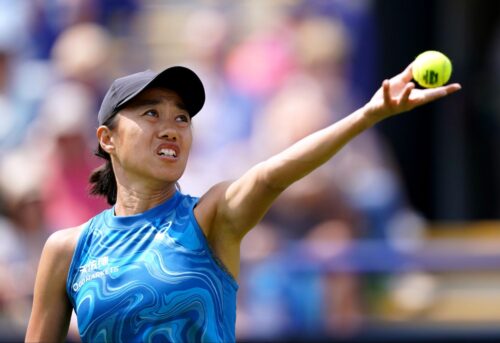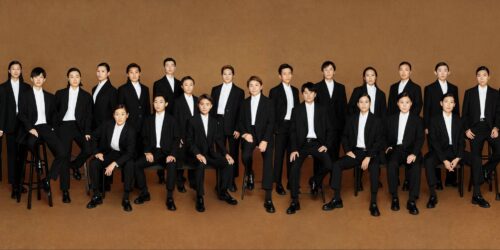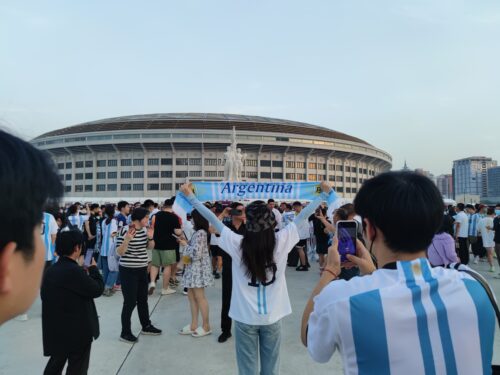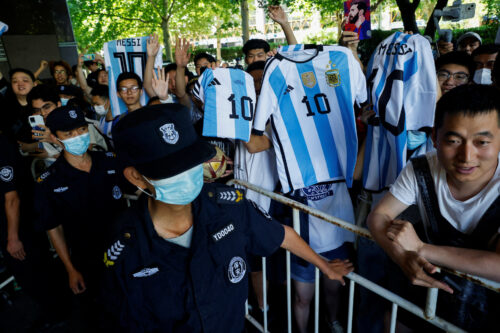Will Chinese soccer teams learn from the failed Carlos Tevez experiment?
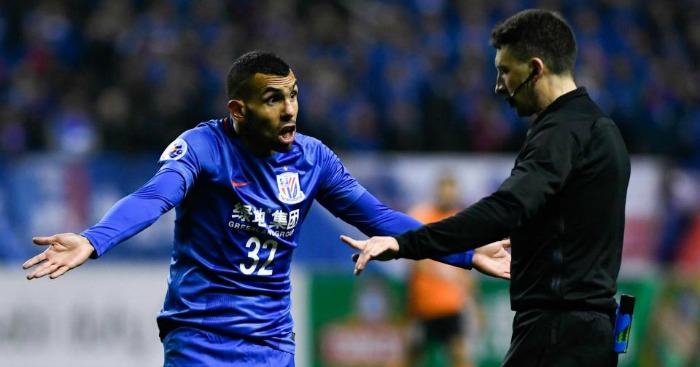
The China Sports Column is a The China Project weekly feature in which China Sports Insider Mark Dreyer takes a look at the week that was in the China sports world.
To be clear, Shanghai Shenhua got badly burned by the failed Carlos Tevez experiment. Don’t believe any of the numbers you’ve heard or seen about what he was being paid to play in China, because the truth is that only Tevez and the club know exactly how much money changed hands.
Whatever the amount, though, he was undoubtedly rewarded very, very handsomely for what was, at best, a very, very underwhelming performance on the pitch and, at worst, a show of willful disrespect to both the club and its fans, such as this spell in a game where he stood practically motionless in the middle of the pitch while play continued around him.
So when Tevez announced on January 9 that he would be returning to Boca Juniors in his hometown of Buenos Aires with a large pile of cash, you might think he would take the opportunity to appease those fans he had let down in Shanghai.
Not a bit of it.
While he did admit to Argentinian TV station TyC Sports that those at Shenhua had a right to criticize him, he readily joked that he had simply been on holiday in China for seven months. Coming soon after comments from Argentine and Boca legend Diego Maradona, who called Tevez’s China strategy “perfect” because he “went to China, filled up Santa’s sack with dollars and came back to Boca,” the incident left Chinese soccer fans fuming.
All the most-liked comments on popular soccer app Dongquidi were insults, with one of the more printable comments saying that Tevez sounds like he is farting when he talks, while others were crystal clear about offering directions out of China. Here’s one fan who just wrote “beat it” (the PG translation of the word 滚 gǔn) over and over:
Many online recalled the time when Tevez and his entourage — believed to stretch to as many as 19 people — visited Shanghai Disneyland at the same time Shenhua was playing a game in Changchun. He was injured at the time, but fans understandably thought he should have traveled to support his teammates instead of hitting the theme park.
Another wag referenced the Treaty of Nanking — which every child in China knows to be one of the most unequal treaties in history — in declaring the “Treaty of Tevez,” namely the first unequal treaty in China’s footballing history. “Hey, we’re rich and stupid! Welcome!”
As the page turns on another embarrassing chapter in Shenhua’s history — and, yes, it does always seem to happen to Shenhua — it’s worth asking what the long-term effects of this saga might be.
For one thing, it’s possible that clubs will be more wary of signing big-name internationals in the future, especially those who are, like Tevez, at the tail end of their careers, though don’t expect the steady stream of made-up transfer rumors linking foreign stars to Unnamed Chinese Club FC to stop anytime soon.
More worryingly, players of a more mercenary disposition now have clear proof that you can still come to China simply for the money and — unlike Drogba and Anelka in years past — actually receive all the money you’ve been promised. Despite a move toward reducing the number of foreign players in the Chinese Super League (CSL, 中超联赛 Zhōngchāo Liánsài), the country’s premier soccer league, the Tevez affair could now prompt players to come to China for all the wrong reasons, thereby harming Chinese soccer instead of being part of the development process.
One current example is Villareal’s Cedric Bakambu, who, if his move to Beijing Guoan goes through, could become the most expensive African player of all time. However, as the transfer continues to drag on with no official confirmation from Guoan, the club may be trying to maneuver around the CSL’s new transfer tax — which effectively doubles the price of expensive foreign players — by, for example, pleading its case to the Chinese Football Association (CFA) that its outbound payment to Villareal is in fact a payment simply designed to trigger Bakambu’s release clause, rather than a standard transfer fee.
Meanwhile, Bakambu told French cable channel Canal+ that he heard Beijing was a very polluted city and didn’t really want to go there, but that “financial circumstances” had persuaded him to change his mind.
Sound familiar?
Elsewhere on the transfer front, Wild East Football says Jiangsu Suning could have a hard time holding on to any of its current foreign stars, while the CFA has become so concerned about clubs overspending that it specifically warned them not to get sucked into a bidding war for Borussia Dortmund’s Pierre-Emerick Aubameyang. League favorites Guangzhou Evergrande then promptly responded with a renewed pledge to field an all-Chinese line-up by 2020.
And in one of those so-unlikely-it-might-just-happen moves, AC Milan midfielder Lucas Biglia has been linked with a big money move to China. The CFA might not like the spending, but with Milan’s Chinese owner Li Yonghong seemingly up the creek as Italian financial investigators pore over the club’s books, the government might just have other reasons for allowing the Chinese-owned club to receive a cash injection.
Controversial red card leads to fan boycott
China’s U23 team went from hero to zero in the space of a few days, as the hosts failed to progress out of the group stages at the AFC U23 Championships. After beating Oman 3-0 in the opening fixture, the State General Administration of Sports (SGAS) published a statement praising Chinese soccer and toasting the country’s successful reform plan.
Turns out they jumped the gun.
A 1-0 loss to Uzbekistan left China needing a result in the final group game, but the youngsters lost 2-1 to Qatar. SGAS quickly deleted the statement.
Usually it’s the players who get it in the neck after a national team disappointment, but this time it was Iranian referee Alireza Faghani, who sent off Chinese captain He Chao shortly before halftime. Fans were so incensed that they organized a boycott of the rest of the tournament, and it’s been pretty successful: the four games since China’s exit have drawn an average official attendance of fewer than 400 fans, though pictures suggest those are very generous figures.
Chinese players flame out of Australian Open

Chinese interest in the Australian Open has also ended early, with none of the six women involved making it as far as the third round. Zhang Shuai beat US Open champion Sloane Stephens in a first-round upset, but lost on Wednesday to Czech qualifier Denisa Allertova, while Duan Yingying — the only other player to make the second round — fell to seventh seed Jelena Ostapenko.
With five players ranked in the world’s top 100, China will surely someday find a worthy successor to Li Na — especially now that the WTA’s season-ending showcase tournament will move to Shenzhen for the next 10 years — but the men’s side looks less promising. The highest-ranked male player lies at 181, with not a single Chinese man making the main draw in Melbourne for the second straight year.
The Korean Unification Flag and its implications
Finally, as the Olympics shift to Asia for the next three Games, the entente between the two Koreas has become one of the biggest news stories of the week, with the IOC expected on Saturday to rubber stamp the joint decision to march behind the Korean Unification Flag — for what would be the fourth time at an Olympics — while plans are also being finalized to field a joint women’s ice hockey team.
While sanctioning world peace would bring the IOC some much-needed positive publicity, there are several problems with the hockey solution. First, if the squad limit is kept at 23, then which South Korean players would be dumped to allow some Northern sistren in? Or if the squad limit is expanded, would there be pressure to ice some weaker players from the North (because coach Sarah Murray sure as hell hopes not)? And if the team is allowed some extra players, what happens if they actually beat someone? Yes, they’re a feel good story, not a medal threat, but the number of goals other teams can put into the Korean net may actually make a difference as to who progresses into the latter stages of the tournament. The ever-neutral Swiss, for one, appear in danger of getting off the fence.
Meanwhile, unperturbed by the heartwarming headlines coming out of Seoul, the Sending States — i.e. the nations that provided troops during the Korean War — met in Vancouver to discuss the ongoing nuclear situation, with the U.S., in particular, keen to stress that Olympic participation should not be confused for a meaningful conciliatory gesture. China, which stands to collect its geopolitical winnings, dismissed the gathering as “Cold War thinking.”
[Related reading – Civil groups call for referendum to scrap ‘Chinese Taipei’ for ‘Team Taiwan’]
Also this week:
- The wild and wacky story of how “Rock Star” — destined to be China’s first NHL player — had his career ended by jealous rivals who didn’t like his attitude.
- Yi Jianlian — once relentlessly pilloried by US columnist Bill Simmons — was named MVP of the CBA’s All-Star game.
- 29-year-old Chan Yuen-ting made history in 2016 as the first woman anywhere in the world to coach a professional men’s team to a top-flight championship. Here’s what Chan’s been up to recently.
- Dazzled by the size of the market, foreign sports teams and athletes have been taking to China’s social media platforms. But is it money or fame they’re looking for?
- Mr. Ma from Anhui named his baby daughter Ma Shaladi 马莎拉蒂, or “Maserati,” in Chinese. His wife wasn’t so happy.
The China Sports Column runs every Friday on The China Project. Follow Mark Dreyer @DreyerChina.




